|
|
|
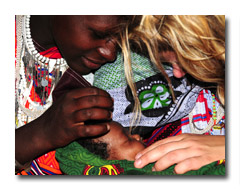 |
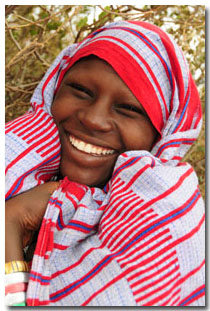 Sauti Moja is working to increase Maasai girls’ opportunity for education. Of specific interest are Child Mothers: school-going girls who face pregnancies and are expelled from school as a result. We’re helping them manage their situations and obtain ongoing opportunities! Sauti Moja is working to increase Maasai girls’ opportunity for education. Of specific interest are Child Mothers: school-going girls who face pregnancies and are expelled from school as a result. We’re helping them manage their situations and obtain ongoing opportunities!
The challenge
Maasai girls are less likely to go to school, less likely to stay in school, and less likely to be successful in school, as compared to their male counterparts. This is due to a host of factors related to cultural values, prejudice in schools, and the poor capacity of school institutions.
One of the main factors inhibiting girls from staying in school is pregnancy. This is a complicated issue, but due to sexual values among the Maasai, the power dynamics in most girls’ relationships, conditions of poverty, and a terrible lack of sexual and reproductive health education, girls are pressured or forced, in some cases, to begin sexual relationships at young ages. This leads to a high rate of pregnancies among school girls and, subsequently, a low school retention rate for teenage girls.
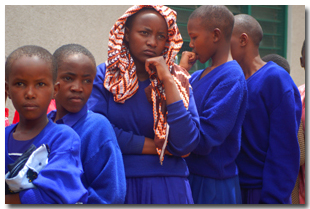 In Tanzania, girls who get pregnant while in a public (government) school are immediately expelled and prohibited from ever returning. There are few countries in the world that retain such an archaic law; unfortunately, Tanzania is one of them. Due to this law, in most cases of pregnancy, Maasai girls return home, and often, they proceed into early marriages, giving up their aspirations to an education and a healthier future for themselves and their future family. In Tanzania, girls who get pregnant while in a public (government) school are immediately expelled and prohibited from ever returning. There are few countries in the world that retain such an archaic law; unfortunately, Tanzania is one of them. Due to this law, in most cases of pregnancy, Maasai girls return home, and often, they proceed into early marriages, giving up their aspirations to an education and a healthier future for themselves and their future family.
All in all, the result is that many Maasai girls’ right to an education is being compromised and right to live free from discrimination is not being protected!
|
|
|
At age 15, while attending secondary school, Sara was pressured into a sexual relationship with an older youth; she didn’t want to but couldn’t withstand the pressure and social ridicule that awaited her from friends and community, if she didn’t. Her choice to have sex was affected by a common misconception among young Maasai girls: she thought, ‘you only get pregnant if you have sex with a much older man’!
When the school discovered her pregnancy, she was expelled and told to never return. She felt hopeless. Her father had died a few years before. Her mom had struggled desperately to keep her in school. She was her family’s only hope to overcome the poverty they lived in! With her pregnancy, hopes were dashed!
With Sauti Moja Canada’s help, Sara has a healthy baby, whom her mom is happily helping to care for. Sara’s back in school! Three generations have a brighter prospect for a secure future. From Sara’s perspective - ”I’ve been given a chance. I will achieve my dreams! I have new hope!”
|
| |
|
|
Our Response
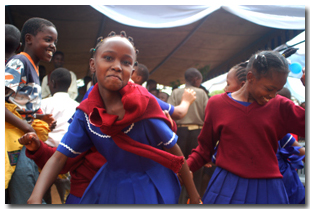
- The Tumaini kwa Wasichana Centre (Hope for Girls Centre) School girls who face early pregnancy and school expulsion are welcomed at the Centre, where they are provided a safe place to stay for three weeks, during which time a Support Worker provides counseling, meets with their families, facilitates access to health care, and provides sexual and reproductive health education. It is a period for rejuvenating hope!
- Support healthy pregnancies Support Workers ensure that each of the girls in the program has access to good medical service to optimize their health and that of their babies. This often includes tranisporting the girl to a hospital for delivery of the baby, and sometimes includes payment for a C-section.
- Family mediation. Support workers maintain a good relationship with girls’ families to encourage them that ongoing school opportunities are available, and that Sauti Moja will assist in identifying these opportunities. The main purpose is to avoid early marriages!
- Scholarship support for private school Sauti Moja is committed to networking with other organizations to solicit financial support, which will allow girls to attend a private school, following their pregnancies. Obviously, costs of private school are high as compared to government schools, so the challenge of raising funds from impoverished families is significant!
- Government lobbying and community advocacy Sauti Moja Canada helped create the Longido Education Advocacy Forum (LEAF), which is a collection of Tanzanian organizations that are committed to protecting Maasai girls’ right to education, including their right to return to school following pregnancy.
- Capacity-building with schools In collaboration with a Dutch organization, SNV, Sauti Moja assists in facilitating workshops with school committees, administrators and managers in order to better address issues relating to girls’ education.
- Sexual and Reproductive Health Education Sauti Moja conducts educational initiatives in local schools in order to empower girls and help them make informed choices.
Our Achievements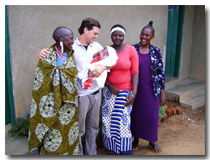
- Girls facing early pregnancies and school expulsion are getting support. Many girls are reporting to the Tumaini kwa Wasichana Centre, and they are getting good support as they transition through the difficult circumstances they face.
- Girls are avoiding early marriages. With few exceptions, our support workers have been successful in family mediation activities and motivating families to help girls return to school following pregnancy.
- Girls are returning to school with renewed hope! Almost all the girls that have come to the Tumaini kwa Wasichana Centre have successfully returned to school, with financial support from Sauti Moja and a host of other Tanzanian and international organizations.
- Girls are making informed choices to prevent pregnancies. Girls are learning about sexual and reproductive health matters, which is empowering and eads to greater self-confidence and healthier choices.
- Schools are addressing issues affecting girls education. Workshops have been conducted with School Management Committees, which are now more aware and proactive concerning the challenges girls face.
- The early pregnancy issue and the law prohibiting girls from returning to school has become a significant political topic. We have raised the issue with a host of government authorities, Members of Parliament, and Parliamentary Committees who are aware of and debate the issue, and beginning to prioritize it. In 2009, there was significant media coverage, including coverage by the Guardian, a prominent UK newspaper.
Did you know?
When Joanne Allgoewer, a retired businesswoman from Ottawa, was volunteering at LOOCIP, a number of school girls came to her in great distress and confided about unwanted pregnancy. The distress was not only related to pregnancy, but also, the accompanying family pressures for early marriage and related loss of hope for a future that included a good education and career. Joanne responded by providing counsel and financial support to a few girls, but as her awareness of the magnitude of the problem increased, she engaged Sauti Moja in discussions about how to provide on-going support to such girls. Joanne and her friends now provide most of the financial support for this program.
|
|

- Join the LECHE Project which is affordable, supports healthy development of Maasai preschoolers, and helps educate your children.
- 1000 Widows Initiative – We’ve helped 161 vulnerable women become self-sufficient, so now we are targeting another 839 over the next three years! More
- Sponsors for child mothers are desperately needed! More
- Read about Sauti Moja’s role in famine recovery here.
- Read about Sauti Moja’s response to global warming here.
|
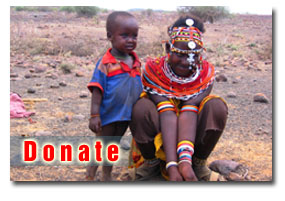 |
|
|
|